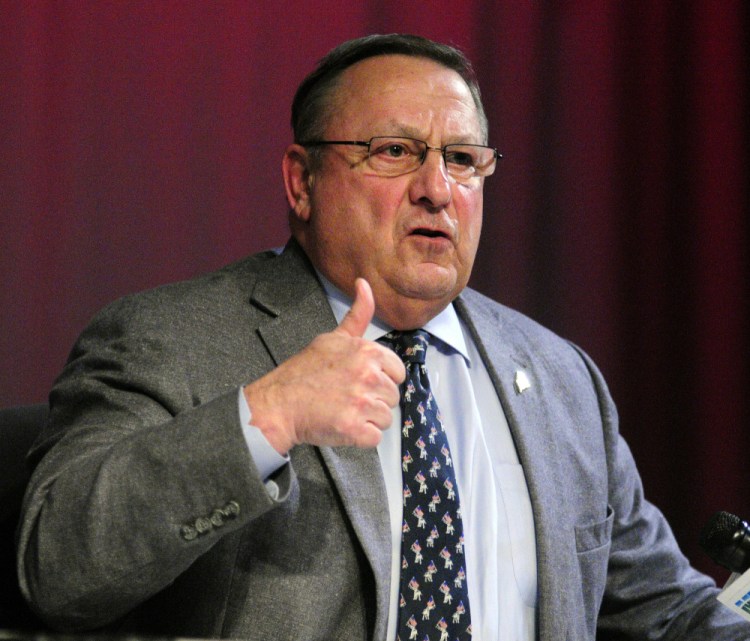AUGUSTA — Gov. Paul LePage said Tuesday that “I had to go screaming at the top of my lungs about black dealers” and make other “outrageous comments” to force the Legislature to take the state’s drug crisis seriously.
LePage’s “black dealers” comment contradicts his earlier assertions that the media and his political opponents – not he – inserted race into the drug debate by misinterpreting his statement that out-of-state dealers often “impregnate a young white girl” in Maine.
The governor made the latest comments during a Tuesday morning radio show on WVOM-FM while expressing frustrations with the Maine Legislature. LePage once again suggested the Legislature has moved too slowly to address the rise in heroin addiction and overdose deaths.
“We got a few more drug agents, but what did I have to do? I had to go screaming at the top of my lungs about black dealers coming in and doing the things that they are doing to our state,” LePage told talk show hosts Ric Tyler and George Hale. “I had to scream about guillotines and those types of things before they were embarrassed into giving us a handful of DEA agents. So this is what it takes with this 127th (Legislature). It takes outrageous comments and outrageous actions to get them off the dime. They just simply don’t move.”
LePage’s reference to “black dealers” alludes to comments he made during a Jan. 6 town hall-style meeting in Bridgton that many observers interpreted as racist and that prompted national media coverage.
“These are guys with the name Dee Money, Smoothie, Shifty – these types of guys – they come from Connecticut and New York, they come up here, they sell their heroin, they go back home,” LePage told the Bridgton crowd. “Incidentally, half the time they impregnate a young white girl before they leave, which is a real sad thing because then we have another issue we have to deal with down the road.”
DENYING RACISM, ACCUSING MEDIA
Two days later, LePage described the comment as a slip-up and that he meant to say “Maine women” rather than “white women.” During a feisty news conference at the State House, LePage then accused reporters and his critics of inciting a media firestorm by implying that the comments were racist.
“I didn’t say anything about white or black and the traffickers. Look, you’re reading things into what I didn’t say,” LePage said during the Jan. 8 news conference. Asked about the names of the drug dealers he used during the town hall, he replied, “What are they, black? I don’t know. I just read the names. I don’t see them because I don’t read your newspapers.”
LePage has been pushing lawmakers to give him more resources to fight out-of-state drug traffickers for well over a year, even threatening on several occasions to call up the National Guard if the Legislature did not act. Critics contend that in focusing on law enforcement, the governor has downplayed the importance of expanding drug treatment programs.
TIMING OF ‘OUTRAGEOUS COMMENTS’
However, the time line laid out by LePage during his radio interview Tuesday doesn’t necessarily square with actual events.
LePage did make the “young white girl” comment before the Legislature passed a bill providing $1.2 million to hire 10 agents at the Maine Drug Enforcement Agency and to provide an additional $2.5 million for drug treatment. But legislative leaders had proposed a bill to fund the 10 drug agent positions one month before LePage’s Bridgton comments, and lawmakers had expedited work on the bill early in the legislative session.
The Legislature passed the $3.7 million drug bill one week before LePage joked in an earlier WVOM interview that Maine should “bring the guillotine back” to use on convicted drug traffickers. While that statement was made in jest, LePage has said on several occasions that he would support executing drug traffickers despite Maine’s current prohibition on the death penalty.
In a written State of the State address sent Monday to the Legislature, LePage wrote: “If a dealer sells the drug that kills a Mainer, we should treat it as a homicide. The penalty for dealing drugs should be decades behind bars. You won’t deal death in our state.”
Send questions/comments to the editors.




Comments are no longer available on this story